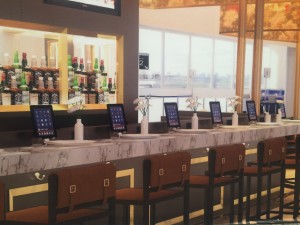
By Kenneth Murphy*
“What would you think if a robot showed up with your food?” This is the question I asked Ross and Kelly, a young couple in a Newark, New Jersey airport restaurant. “Oh, interesting,” answered an intrigued Kelly. “No thanks,” disagreed Ross, “you would miss the human touch.”
Is Technology Ruining Your Life? Take A Quick Quiz To Find Out By Clicking Here.
Not the best way to start a conversation, but I needed to ask my fellow diners about the elephant in the room. Instead of being greeted by a waiter or waitress, we were being stared up at by cold, impersonal iPads bolted to the center of the table between the flowers and candle. If we wanted food, we needed to press the home button and ask Mr. iPad for the specials.

“I-pay for human help not i-Help,” I joked, while leaving in search for a human staffed establishment. To my dismay each and every restaurant in Newark concourse C was staffed by iPad iWaiters. This reminded me of a book titled Return to Order, in which the author John Horvat shows how the human touch in economy calls for a “deal directly with someone” rule that could not be followed today.(1)

After deciding on a sub sandwich stand, I approached the still (but probably not for long) human cashier attendant and asked, “I already know what I want. May I skip the iPads and just talk to you?” “Unfortunately not!” was her reply. She was actually prohibited from taking food orders directly even though she used to do so a few weeks before. Now she only collects cash payments and insures the right person gets the right sandwich.
With no other option I placed my order on the iPad. A small printer underneath spat out a paper slip listing the cost, order number, and directions to return back to the lady for cash payments. When my cheese steak sub and potato salad arrived I shared my fears with her that eventually we’ll be getting our food robotically delivered. “I hope not. That’s when I lose my job and the machines take over,” she sighed.

I returned to the diner to check how the young couple was getting along. Thankfully a human had delivered their food and I asked them how the iOrdering went. “I ordered both meals on my iPad,” said Ross, “but it wanted me to pay right away and it wouldn’t take my card.” “We couldn’t find out what the ingredients were,” added a now less enthusiastic Kelly.
No Thank You!
Transactions today are increasingly impersonal: Need money? Go to an ATM. Need gas? Pay at the pump. Flying with bags? Self check-in. Buying food? Self-pay checkout. Have a question? Call the robotic customer service. Eating out? Order on the iPad. Some might save the customer time, but are designed to save companies money.
Thankfully however, people are reacting against the automation (even if time is saved) precisely because of its lack of humanity. When Starwood Hotels experimented with “virtual smartphone keys” many hotel guests reported back that they missed going to the front desk. After their travel, hotel guests wanted a smile and a “have a good night!” Guests using their phones to enter their rooms saved time but cost the comfort of being welcomed.(2)
But will businesses listen to their customers? Micah Solomon of Forbes says few  companies can afford not to listen because customers now want warmth, personalization and humanity more than just efficiency.(3) A January 2015 The Sydney Morning Herald article also prophesies that “there will be a renaissance of demand for organic human labor in the same way we are seeing people no longer want processed foods or mass-produced fashion. If we automate all basic tasks then we could ultimately lose the intangible benefit of the ‘personal touch’.”(4)
companies can afford not to listen because customers now want warmth, personalization and humanity more than just efficiency.(3) A January 2015 The Sydney Morning Herald article also prophesies that “there will be a renaissance of demand for organic human labor in the same way we are seeing people no longer want processed foods or mass-produced fashion. If we automate all basic tasks then we could ultimately lose the intangible benefit of the ‘personal touch’.”(4)
So we humans need more than speed and fast service. As Mr. Horvat proves in Return to Order, when our economic transactions lose the human element they also lose the warm personal bonds that are so essential for trust, kindness, gratitude, and comfort.(5) Whether we are going to eat or sleep, robots, automation and virtual assistance will never be able to replace the charitable human touch.
1 I recommend John Horvat’s “Eight Things You Can Do to Restore the Missing Human Element in Economy” at http://www.returntoorder.org/2013/11/eight-things-you-can-do-to-restore-the-missing-human-element-in-economy/
5 John Horvat II, Return to Order: From A Frenzied Economy to An Organic Christian Society – Where We’ve Been, How We Got Here, and Where We Need to Go, (York Press, York, Pennsylvania, 2013) p.71.


